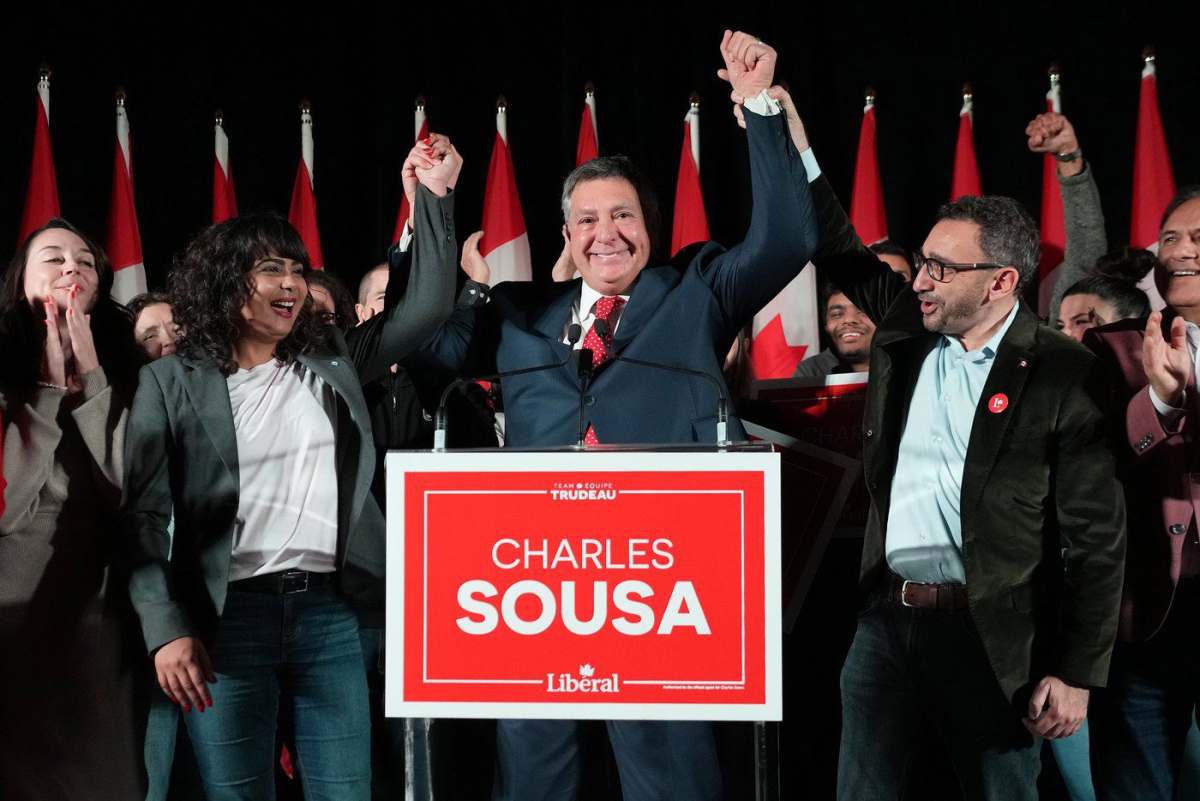Support strong Canadian climate journalism for 2025
The early results from a Greater Toronto Area byelection Monday suggested an imminent return to government for former Ontario finance minister Charles Sousa — this time as a federal member of Parliament.
With just under 20 per cent of the vote counted, Sousa arrived at a campaign event in Mississauga declaring himself the winner, to cheers from a crowd of more than a hundred supporters.
"As your voice in Ottawa, I want you to know that I am here to provide support, to work with you and the community, and to be pragmatic at finding the right solutions to those challenges that we face," Sousa said during a victory speech.
"It is an honour to serve this big community and to join the team in Ottawa that shares those values."
Sousa was winning by just under 20 percentage points with nearly half of the votes counted, or 110 out of 234 polls in the riding reporting. He had 52.5 per cent of the vote to his Conservative opponent's 33 per cent, with the NDP candidate a distant third at 6.5 per cent.
The Liberal Party also declared victory late Monday evening, saying in a news release that this leaves it "in a strengthened position" at the end of 2022.
If that dramatic lead held as the remainder of votes were counted, it would be a negative sign for new Conservative Leader Pierre Poilievre, said Philippe Fournier, the creator of 338Canada, a statistical model of electoral projections based on polling, demographics and elections history.
Reacting to the early results, Fournier noted that the byelection appeared to have low turnout. The first 34 per cent of votes counted only represented about five per cent of registered voters.
That's a turnout of about 15 per cent, based on those early results. Fournier said such a low number could be a sign of either "apathy or general satisfaction." Both are good signs for the incumbents.
He suggested that if Liberals retained a significant lead, that would mean that Poilievre was "doing worse" than his two immediate predecessors, Erin O'Toole and Andrew Scheer.
Though Fournier warned against reading too much into any byelection result, the Liberals, emphasized the win as an indictment of Poilievre.
"Tonight, voters in Mississauga–Lakeshore rejected the reckless policies of Pierre Poilievre’s Conservatives," the party's national director, Azam Ishmael, said in a statement.
During a campaign that saw big-name Liberals dropping by the Mississauga-Lakeshore riding and federal ministers manning the phones, Sousa sold himself as an experienced decision-maker able to work with opponents across the aisle.
The former banker had lost his seat in the 2018 election that saw the provincial Liberals fall from the governing party to one without official status in the legislature.
He thanked those who helped him on the campaign during his victory speech Monday evening, saying he couldn't have done it alone. Transport Minister Omar Alghabra and Liberal MP Iqra Khalid were both by his side.
"Nothing's gonna change in Ottawa, regardless of the outcome of this election," Sousa said in an interview ahead of the byelection. "So who do you want to fight for you and be there for you? I'm getting a lot of positive feedback."
At an event for Sousa on Monday evening, campaign volunteer Patti Jannetta called Sousa a visionary and said she had heard a lot of positivity from voters.
"I am feeling really confident because I think people are confident in him," she said at the Oasis Convention Centre shortly before polls closed.
As dozens of supporters waited for the results to trickle in, they sat around tables chatting over loud blues music played by a live band, some sipping on beer or wine. Later, the crowd swelled to well over 100 and the atmosphere became more celebratory as Sousa's lead held.
A more-modest Liberal win would simply have been "business as usual," Fournier said before the vote. However, it would have been a very different story had the Conservative Party managed an upset.
At first glance, Monday's federal byelection in a coveted Greater Toronto Area riding had seemed like a potential nail-biter.
It was the first contest under the Conservative leadership of Poilievre, in an area of the country crucial to his party's chances of success in future federal elections.
And the contest, in a district the Tories won when Stephen Harper earned a majority mandate, came seven years into the tenure of Prime Minister Justin Trudeau, whose government is on its second minority stint in Parliament.
As Tories dampened expectations for their performance in Mississauga-Lakeshore, Poilievre was scarcely visible, though he tweeted his support for the Conservative candidate, Ron Chhinzer, on Monday afternoon.
Fournier said Conservatives will need to learn how to win again in the regions outside Toronto if Poilievre wants a shot at becoming prime minister.
"When you look at the riding map, the Conservatives have maxed out in Manitoba, Saskatchewan, Alberta. They could win maybe a handful more in Atlantic provinces, maybe two, three more in Quebec, maybe two, three more in B.C.," he said.
"That doesn't give you victory. They have to win more in Ontario. Where are the potential gains for the Conservatives? It's into the Mississaugas and the Scarboroughs."
The byelection was announced after Sven Spengemann, the former Liberal MP, announced earlier this year that he would resign to pursue a new job at the United Nations.
Final results in Monday’s contest will not be tabulated until local special ballots are added to the tally, beginning on Wednesday.
This report by The Canadian Press was first published Dec. 12, 2022.




Comments